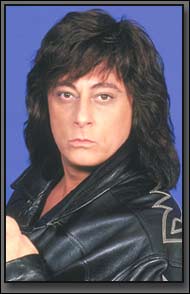Born in Hackensack, New Jersey, on August 2nd, Joe Lynn Turner first developed an appreciation for music by hanging around a local gospel church. One of his first bands in the late 1960's was appropriately called, Filet of Soul. It featured a young r&b singer named J.T. Taylor who would later enjoy success as the frontman for "Kool and the Gang."
JLT forged his musical identity listening to artists such as the Beatles, Jimi Hendrix, Otis Redding, Free,
Mountain, and Deep Purple which left an indelible impression upon Joe. In 1972, JLT was primarily known as a guitar player. He formed Ezra (named after poet Ezra Pound), a band that gained some local notoriety. They performed both original material and covered songs by Yes, Hendrix, Deep Purple.
In 1973, Joe's music career was sidetracked when he enrolled in college
and earned a degree in Education. After graduation, his teaching credentials came in handy.
To support himself, JLT taught college-level English Literature.
FANDANGO
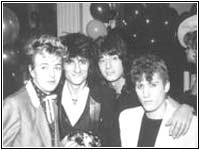
FANDANGO |
Joe gave up a career in academia to pursue his lifelong passion of writing
and performing music. In 1977, he joined Fandango. Their sound was an eclectic mix of R&B,
pop, southern rock and blues, reminiscent of artists like Steely Dan, The Eagles, and The Allman
Brothers Band. Between 1977 and 1980, the band released four albums through RCA Records. Joe
traded lead vocal responsibilities with a couple of the other members for first two albums,
Fandango and One Night Stand,
and, in an odd twist of coincidence; he also shared guitar duties with fellow bandmate
Richard ("Rick") Blakemore. It became very obvious that Joe's powerful and expressive
voice was one of Fandango' s biggest assets and he progressively took over more of the
lead vocal duties on each subsequent record.
Fandango had a loyal following, especially in the tri-state area of New
York, New Jersey, and Pennsylvania. The band toured with The Marshall Tucker Band and The
Allman Brothers. While promoting the Last Kiss
record in 1978, Fandango were slated to appear at summer festival concert in Chicago with
the Marshall Tucker Band, The Beach Boys, and Billy Joel. Misfortune occurred when all of
Fandango's gear was stolen from the back of a truck. The group never really recovered from
this incident.
Fandango did go on to record one more album, Cadillac.
The band eventually broke up soon after its release in 1980. Fandango didn't quite reach
the level of success Joe or the rest of the members had hoped, Although the extensive touring
and recording provided him with immeasurable experience.
OVER THE RAINBOW
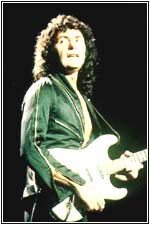
RITCHIE BLACKMORE |
Sometimes you have to take a step backward to move forward. After
Fandango split-up, Joe returned to the New York City club circuit. At the same time,
in the fall of 1980, former Deep Purple guitarist Ritchie Blackmore was in search of
a new lead singer for his current project, Rainbow. Rainbow, while very popular overseas,
never seemed to garner the same level of notoriety in the United States. Blackmore's
assistant had introduced him to the Fandango records and he was very impressed with
Joe's singing. Out of the blue JLT's phone rang and on the other end of the telephone
was Ritchie Blackmore's manager. Joe hopped a train to Long Island to audition for
Blackmore and by the end of the evening he was writing and recording with Rainbow.
With JLT, Blackmore found a versatile vocalist who had the musical
chops to sing a melodic ballad, as well as the heavier rock material. Rainbow's first
record with Joe, Difficult to Cure,
was released in 1981. It featured the Russ
Ballard penned "I Surrender" and the original "Can't Happen Here." Both singles received
significant airplay on Album Rock radio stations in the U.S. Surprisingly, "Jealous Lover",
an unreleased B-side earned even more radio exposure and proved to be an instant fan favorite.
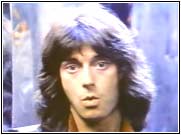
STONE COLD |
Straight Between the Eyes,
was released in 1982. Its first
single "Stone Cold" helped Rainbow crack the US singles chart (#40) for the first time,
ever! Since most of the songs on Difficult to Cure had been written prior to
his joining the band, Joe now became a more integral part of Rainbow. JLT, Blackmore,
and Roger Glover (bass player and producer) collaborated on most of the songs.
While keyboardists and drummers had changed, Blackmore, Turner, and Glover remained
the core of Rainbow.
The band continued to tour the United States, Europe, and Japan.
On stage Joe was able to handle the back catalog of songs by Rainbow's vocal predecessors,
Ronnie James Dio and Graham Bonnet easily. With Joe fronting the band, Rainbow was
finally becoming a major concert draw in the U.S.
In the fall of 1983, Rainbow released Bent Out of Shape, which
was an even more "radio friendly" then the previous record. Two Album-Rock singles
were released: "Can't Let You Go" and the hypnotic/vocal driven "Street of Dreams."
Rainbow toured to support the record and by March of 1984, the
band headed over to Japan for some sold-out performances at Tokyo's legendary Budokan
arena. This proved to be a fitting epitaph since on the plane ride home, Ritchie
Blackmore informed the rest of the group that he and Roger Glover were disbanding
Rainbow and reforming Deep Purple.
JLT GOES SOLO
After signing a deal with Elektra records, JLT began working on
his first solo album. Rescue You,
released in October of 1985, was produced by Roy Thomas Baker, known for his work
with Queen and The Cars. JLT co-wrote most of the songs with keyboardist Al Greenwood
(ex- Foreigner). The record's first single, "Endlessly," received an extensive
amount of airplay on radio and MTV and a non-album track, "Heartless", appeared
on the soundtrack to the movie, "Heavenly Kid."
Around this time, JLT ran into Michael Bolton, who turned him on
to the lucrative business of singing and writing T.V./radio advertising "jingles."
Most singers do not have the chops and versatility to pull off "session work." Joe
has always maintained his motto: that a "singer SINGS!" Over the years, JLT has become
one of the most in-demand
session singers. You can hear him on everything from Budweiser,
Domino's Pizza, and Gatorade commercials, to the original sports-themed anthems for
The NHL's Detroit Red Wings and the NFL's New York Jets.
In addition to the radio and T.V. work, Joe has contributed to
various recordings as both a vocalist and songwriter. With steady studio work always
available, it allowed him the freedom to be picky about his group and solo projects.
He has worked on projects by artists ranging from Billy Joel and Cher to Mick Jones
(Foreigner) and Lita Ford.
THE ODYSSEY ALBUM
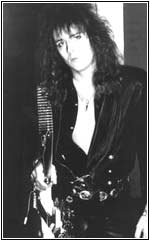
YNGWIE MALMSTEEN |
A follow up solo record was planned, but never released. Creatively,
Joe has always preferred to collaborate with other artists, and in 1987, he decided to
devote his full-time to a "band" project. Coincidentally, Swedish guitarist Yngwie
Malmsteen and his record label in the late 80s (Polygram) wanted to help him find a
singer and collaborator with whom he could develop songs that were more palatable for
Album Rock radio. For Polygram, JLT was a logical choice: Polygram was the label Rainbow
was on in their most commercially successful years with Turner. Polygram's instincts
proved correct and Odyssey, released
in 1988, went gold and the single, "Heaven Tonight" was a hit on both rock radio and
MTV. While Odyssey was a guitar driven album, the songs were also filled with
plenty of memorable hooks and vocal dynamics courtesy of JLT.
The "Odyssey World Tour" was highlighted by a 10-night stint in
Leningrad, Russia. Those shows were recorded and released in the form of the Live in Leningrad: Trial by Fire album
and video. While the JLT-Yngwie union was successful, it was
not without its difficulties. Yngwie's keen vision of what he wanted to accomplish
with his music was often unyielding to new ideas and collaboration. After the tour,
JLT decided to move onward and upward.
THE REVAMPED DEEP PURPLE
Sometimes lightening strikes twice and in the winter of 1989, there
were rumors circulating that Ritchie Blackmore wanted to put Rainbow back together with
JLT. Around this time Deep Purple were looking for a singer to replace Ian Gillan.
Gillan's shoes would not be easy to fill and sources had Survivor's Jimi Jameson and
Ronnie James Dio on Purple's short list of candidates. The band had held secret
auditions to find a suitable replacement, but nobody seemed quite right. Blackmore
suggested that they audition JLT. Initially there were reservations; with JLT,
Blackmore, and Glover together again, their music may be compared to Rainbow's.
After Joe's "tryout" all critical concerns were thrown aside; Joe's vocals and
songwriting ideas had clearly impressed the members of Deep Purple. By December
of 1989 Joe Lynn Turner was now fronting the band that he ironically grew up playing
the cover songs of!
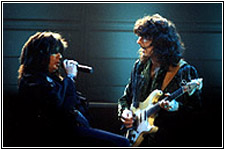
JLT & DEEP PURPLE 1991 |
Deep Purple set out to capture the elusive live "feel" in the
studio while recording their first album with Turner---Slaves & Masters. To
accomplish this, a lot of music was written during and taken from extended practice
sessions. The first single, "King of Dreams", was lifted off a tape that producer
Roger Glover kept rolling during a rehearsal "jam."
Slaves and Masters had the spirit of the classic Purple
records of the 70's combined with a contemporary vibe. Joe's vocals/songwriting
sparked new life into the band. Although Joe admired and respected Ian Gillan as
a singer, he was not attempting to emulate or copy Gillan. Joe often stated that
he was simply "making his own footprints" within the band structure that was
Deep Purple.
For the 1991 Slaves and Masters World Tour the band changed
the set list more than it had in 20 years. While fan favorites like "Smoke on the
Water" and "Highway Star" remained, the band opened with "Burn", which had not been
performed since David Coverdale was in the group back in 1975. With Joe's vocal
versatility and his ability to improvise, the band felt confident enough to branch
out and play "Hush" or even blast into covers ranging from Procol Harrum's "Whiter
Shade of Pale", to "Hey Joe" by Jimi Hendrix.
NOTHINGS CHANGED
In the Summer of 1992, sessions commenced for the follow up to
Slaves and Masters at the legendary Bearsville Studios in New York. Purple
had layed down the backing tracks and Joe even recorded some vocals. In the middle
of the sessions, the rest of the members decided a change was necessary due to
pressure from the record company and internal band politics. They agreed to rehire
Ian Gillan and although Joe and the Purple parted ways amicably, leaving his dream
band was a big disappointment. Joe took some time to himself to recharge his creative
juices. As an interesting footnote to Joe's time with Deep Purple, Ritchie Blackmore,
never one to compliment his own work, maintains that Slaves and Masters is his
favorite Purple record since the reunion in 1984.
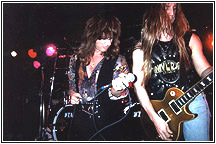
JOE LYNN TURNER BAND |
Looking to regroup and rediscover his passion for music, Joe toured
the East Coast with "JLT and his All-Star Band." They played Deep Purple and Rainbow
classics, along with rock standards and unreleased material. Joe was also approached
by drummer Carmine Appice (Vanilla Fudge/Blue Murder) to join a project called
Mother's Army as the lead vocalist. The project featured Bob Daisley (Ozzy Osbourne)
on bass, and Jeff Watson (Night Ranger) on guitar. Mother's Army released their debut
album, Mother's Army, overseas. Musically it could be
described as "progressive metal."
With plenty of song ideas stored up, Joe decided it was time for
another solo record. He enlisted the help of longtime friend/guitarist Al Pitreli
(Alice Cooper, Savatage, Megadeth). Signed to an independent label and working with
a modest recording budget, Joe recruited friends to play on the record who shared his
passion for good songs and musicianship. Things had come full circle in many ways for
JLT and fittingly enough he titled this album, Nothing Changed. It was Joe's
most personal and introspective to date. Many of the songs are acoustic driven with
rich textures and strong vocal harmonies. The album gained critical acclaim and an
overseas journalist called it one of the best releases of the year.
JLT also kept busy lending his vocal talent to "tribute" projects
featuring covers of songs by Cream, Van Halen, ACDC, and Ozzy Osbourne. Joe also sang
on the funky Black Night: Deep Purple According to New York --- brainchild of
funk/rock bass player TM Stevens (named in Guitar Magazine as one of the most underrated
releases of the year).
In 1996 Joe was able to reconcile his past difficulties with Yngwie
Malmsteen and hooked up with the guitarist to record vocals for Malmsteen's Inspiration record. Inspiration was
Yngwie's showcase of songs by guitar players who had
influenced and inspired him. Joe sang three songs: Jimi Hendrix's "Spanish Castle Magic",
along with two Deep Purple cuts, "Pictures of Home" and "Demon's Eye."
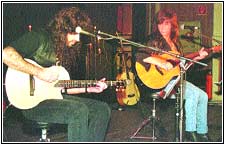
jlt AND NIKOLO KOTZEV |
Around this time, there was yet another project that peaked Joe's
interest called Brazen Abbot. This effort was spearheaded by Finnish guitar player,
Nikolo Kotzev. For the first record, Kotzev used former Deep Purple bass player/singer,
Glenn Hughes. Since Hughes was unavailable for the next record, Kotsev asked Joe to
replace Hughes on the next venture. Joe , who is both a friend and fan of Glenn Hughes,
was impressed with the first Brazen Abbot record, Live and Learn, so he agreed
to join the project. Joe sang/co-wrote the lyrics for four songs on Eye of the Storm.
The music is hard rock euro-metal, with classical undertones; a combination of heavier
Rainbow and Purple, along with shades of the Malmsteen/Turner Odyssey record.
UNDER COVER
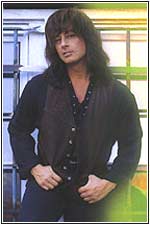
UNDERCOVER |
In 1997 Joe decided to pay homage to artists that influenced and
inspired him. He released Under Cover
--- a diverse set of songs ranging from Grand Funk Railroad ("We're an American Band")
to Marvin Gaye ("Chained"). He even re-recorded an early Fandango song and Rainbow's
"Street of Dreams."
In 1998, Joe released his next solo album of all-original material.
An aptly tongue in cheek expression Hurry Up and Wait
was chosen for the title. Unlike its predecessor, Nothings Changed, this record
is more of a return to JLT's roots of blues based rock 'n roll, full of catchy guitar riffs.
JLT's busy year rocked on as he sang four songs on the Brazen Abbot
release Bad
Religion. JLT also appeared on Stuart Smith's Heaven & Earth album alongside of a
veritable "who's who" in hard rock, including Richie Sambora,
Glenn Hughes, Carmine Appice, and Heart guitarist Howard Leese.
The third Mother's Army, Fire
on the Moon, was released in 1998. There were a few changes with
Ansley Dunbar taking over the drum kit from Carmine Appice. While the first two
Mother's Army records were written primarily by Jeff Watson and Bob Daisley alone,
Joe co-wrote all the songs for Fire on the Moon.
INTO THE LIGHT: THE NEW MILLENNIUM
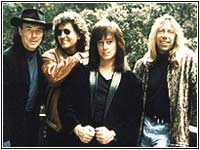
MOTHERS ARMY |
JLT released Under Cover 2
in 1999. This collection of songs
is a bit heavier in overall sound, geared more towards the Japanese market. Featured:
songs by Deep Purple, "Lady Double Dealer", and Rainbow's "Lost in Hollywood", dedicated
to the late Rainbow drummer Cozy Powell, along with rock classics like "Rock and Roll
Hoochie Koo" and "Mississippi Queen, " featuring guitar greats Rick Derringer and
Leslie West, respectively.
Joe returned the favor to fellow Hackensack native Leslie West by
singing lead and background vocals on a few tracks for West's As Phat as It Gets. The summer
of 2000 brought the release of another JLT solo album, Holy Man. This album is a mix of AOR,
classic metal, and good old-fashioned blues based rock. Joe wrote most of the songs
with Japanese guitarist, Akira Kajiyama and blues guitar-prodigy Joe Bonamassa, both
of whom shared the bulk of the guitar work. While Hurry Up and Wait
allowed Joe to get his rock ?n roll feet wet ("again!), he seemed to have found his
footing with Holy Man.
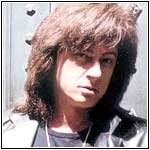
JLT HOLY MAN PROMO |
In 2000, Joe also joined The Voice of Classic Rock (VCR)--- an
Internet company launched by a bunch of renowned rock vocalists and musicians such
as Mickey Thomas (Jefferson Starship), Larry Hoppen (Orleans), Mike Reno (Loverboy),
Bobby Kimball (Toto) and many others. "The Voices", put on shows all over the world (Check the concerts menu)
covering signature rock classics by each of the members, along with a few surprises.
The VCR website www.rockforever.com, contains information about VCR artists, authorized
bootlegs and informative articles about the music industry.
As the new Millennium came and passed, Joe Lynn Turner is busier
than ever these days. Along with his diverse musical projects, session work and a
successful solo career, Joe continues to involve himself in interesting and varied
projects with some of the most talented people in the entertainment and music industry.

![[To Top]](http://andleaf.com/img/icons/uu_mal.gif)
